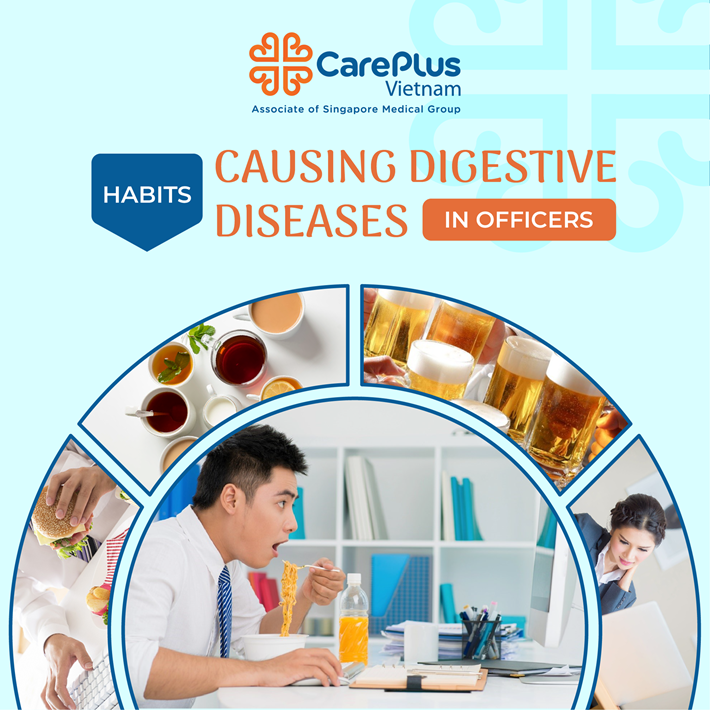Habits causing digestive diseases in office workers
With the dense nature of work, many office workers easily have the habit of skipping meals, eating late or having irregular meal times. Some changes and imbalances can also occur with the intestinal microflora when the rhythm of eating and daily activities is erratic. Let's take a look at the habits that cause illness with CarePlus

2/21/2023 10:29:37 AM
Unscientific eating
Unbalanced eating habits such as regularly skipping breakfast, eating while working, eating at the wrong time, lying down right after eating... are the causes of diseases of the intestines and stomach. Skipping breakfast regularly indirectly causes stomach damage. Because the feeling of hunger causes the stomach to always contract, gastric juice secretes a lot but there is nothing to digest, which gradually leads to stomach pain. What's more, skipping breakfast makes you eat lunch and dinner to replenish your energy. While, eating too much dinner can cause bloating and indigestion.
When eating and working, people often do not chew well, eat quickly, swallow quickly, causing the stomach to work hard, increasing the risk of stomach diseases. In addition, when eating quickly, the food is not crushed and mixed with digestive enzymes in the oral cavity, causing difficulty in swallowing. Losing concentration when eating also reduces acid secretion in the stomach, making food difficult to digest and the body difficult to absorb nutrients. For example, for fruits and vegetables, if you do not chew well, the outer cellulose coating is not broken, making it difficult for the body to digest and absorb the nutrients inside.
Drink a lot of coffee, green tea, milk tea
Drinking a lot of caffeine in tea and coffee can stimulate the stomach to secrete more acid, leading to bloating. This makes stomach ulcers or gastroesophageal reflux worse. When eating foods rich in fat and protein, drinking green tea can also cause constipation. Furthermore, drinking green tea on an empty stomach increases acid secretion, which can damage the digestive system.
The habit of drinking milk tea not only causes weight gain, but the tannin in tea mixed with protein and casein in milk also increases the risk of bloating and indigestion.
Sitting a lot, sedentary
Being sedentary reduces intestinal motility and digestive secretion function of the stomach and intestines. This causes food to accumulate in the digestive system, causing gas and bloating. In addition, sitting a lot also increases pressure on the anal and rectal area, so many office workers have hemorrhoids, even rectal prolapse.
According to the National Institute of Nutrition, more than 10% of the population of our country suffers from diseases of the gastrointestinal tract and tends to increase. Meanwhile, the intestinal tract is the place where more than 70% of the immune system is concentrated. Protecting a healthy digestive system is a way to help the immune system run smoothly, ready to activate when harmful agents enter the body.
Screening for gastrointestinal diseases is a necessary job to help protect health and detect many dangerous diseases early, timely detection and treatment will help you dispel worries about these diseases and have a healthy life. live healthier. If you have any of the above symptoms, take the initiative to schedule an early visit at CarePlus so that experienced doctors can diagnose and intervene as soon as possible.
Office people need to pay attention to adjust the scientific and reasonable diet; increase exercise, practice sports. Drink enough filtered water, limit the use of alcohol, tea, milk tea; balance nutritional composition in meals among four groups of protein, starch, fat, vitamins and minerals to help prevent digestive diseases and improve health.